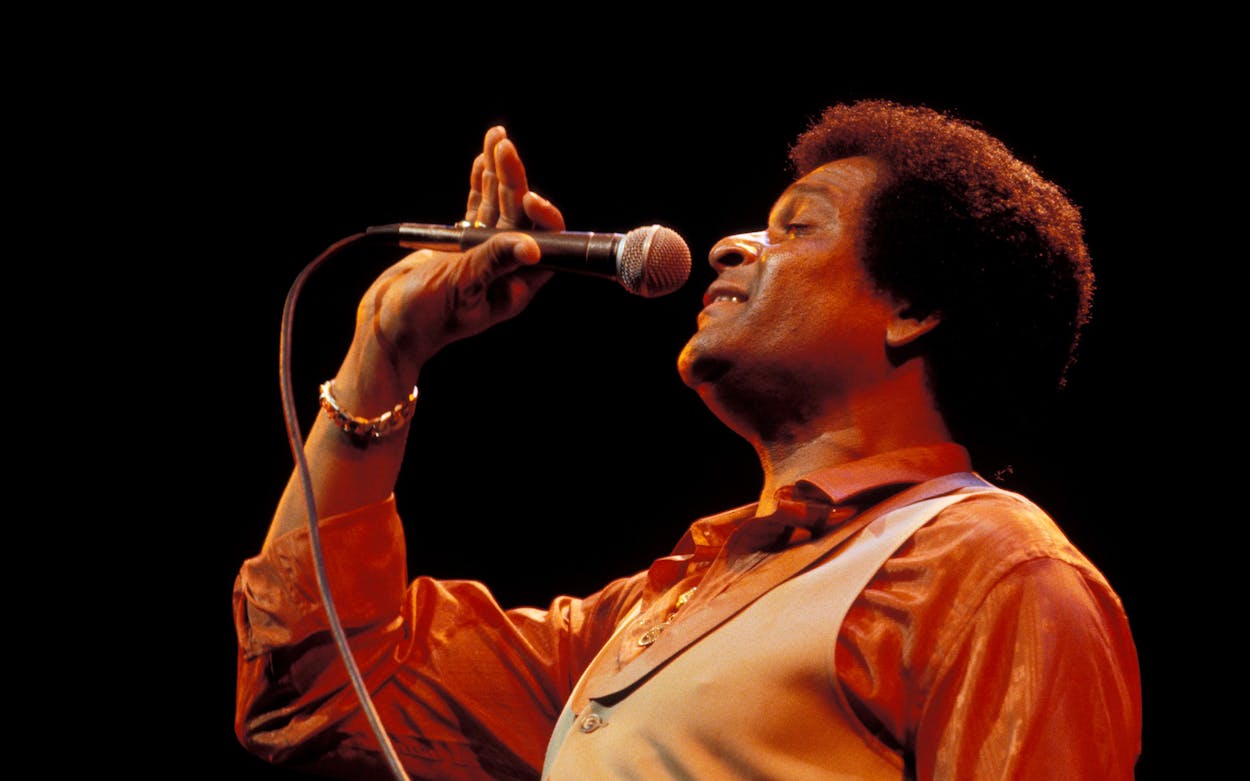Some country music legends, such as Willie Nelson, are beloved for spinning yarns impossible to dislodge from either your head or heart. The late Billy Joe Shaver was a showman as much as he was a musician—winding up crowds before him like a wristwatch, then dropping to his knees as he ripped through a barn burner onstage.
But Charley Pride, who died on Saturday at age 86 from COVID-19, was lauded for his no-frills delivery and steady baritone on pop-embossed country tunes such as “Kiss an Angel Good Mornin’,” one of more than fifty Top 10 hits under his belt. Pride sold about 70 million records, won three Grammys, and was the first Black solo country singer to perform at the Grand Ole Opry, among many other firsts. From the late sixties through the late eighties, Pride was the genre’s most visible Black superstar—a feat, no doubt, that has sometimes overshadowed his talents as a musician. “The world is lost today,” said fellow country musician Tanya Tucker in a statement. “He’s one of the greatest singers of all time.”
Born in Sledge, Mississippi, in 1934, Pride picked cotton alongside his parents, Tessie Stewart Pride and Mack Pride Sr., who were sharecroppers. Country music, particularly the sounds of the Grand Ole Opry, thrummed throughout Pride’s childhood household from a radio. At the age of fourteen, he bought a Sears, Roebuck & Co. guitar and taught himself to play by emulating his favorite singers. Around that time, Jackie Robinson broke the color barrier in baseball; a galvanized young Pride saw the game as his “way out of the cotton fields,” as he told NPR.
Pride pitched and played outfield for several Negro league baseball teams, including the Memphis Red Sox, in the fifties before being drafted by the Army. He was discharged after two years and decamped to Montana, where he worked grueling shifts at the Anaconda Copper Mining Company as a smelter and continued playing baseball for a local semi-pro team, the East Helena Smelterites. He’d intended to break records in baseball and try his hand at singing later on, in his mid-thirties.
But Pride started to draw crowds at Montana honky-tonks, where he strummed and sang after work. In 1962, he went backstage at a show headlined by Red Foley and Red Sovine, two country mainstays, and wound up performing a few numbers later that night. His renditions of “Lovesick Blues” and “Heartaches by the Number” floored Sovine, who told Pride he ought to give Nashville a go. Pride packed his bags.
Nashville’s white record executives balked when Pride came in to perform his songs. They offered insulting suggestions, such as asking him to “sing in your regular voice.” When RCA executive and musician Chet Atkins eventually signed Pride in 1965, two years after he’d moved to the city, the company didn’t send out the musician’s promotional photo along with his first singles. Several disc jockeys refused to play Pride’s records after learning he was Black; many country singers stood by him. Willie Nelson once kissed Pride square on the mouth at a concert as a show of solidarity, and Faron Young, the Shreveport-born country singer, told one radio station manager that if the station stopped playing Pride’s records, it could forget about Young’s too.
Music industry gatekeepers’ combativeness notwithstanding, Pride ascended quickly. He snagged his first Grammy nomination in 1967, for the down-home heartache of “Just Between You and Me.” Within the next two years alone, seven of his singles were in the Top 10, and his cover of Hank Williams’s “Kaw-Liga” scaled up the top three in 1969. He remained a hitmaker for the next two decades. Among Pride’s most popular tunes were “Kiss an Angel Good Mornin’,” a 1971 crossover smash that earned him several CMA Awards, and the lonely heart anthem “Is Anybody Goin’ to San Antone.”
As his music career took off, Pride wanted to move his family to a progressive city with a sizable airport. He settled on Dallas. “I grew up in a segregated society, and I didn’t want to subject my three kids to that,” he told the Dallas Morning News. “We picked out what we thought was the best place for the kids, and also for traveling around the world, and you couldn’t find a better place for that than Dallas.” Pride spent much of his later life in Texas, in between recording and touring. Before the pandemic, he was still getting out to perform about 45 shows every year, as he told Montana Sports this summer.
In November, Pride received the Country Music Association’s Lifetime Achievement Award. The prize was presented to him by rising country star Jimmie Allen, who performed “Kiss an Angel Good Mornin’” with him at the ceremony. While it’s unclear where Pride contracted the coronavirus, the ceremony has been criticized by some, including the Arlington-bred country musician Maren Morris, for the fact that it happened indoors—and that mask enforcement appeared to be lax. (The CMAs maintain that the organization was “following all protocols” set by the Centers for Disease Control and Prevention and that all tables at the awards were set eight feet apart.)
In a video of Pride’s performance at the CMAs—his last ever—few glammed-up attendants at the socially distanced ceremony could be seen wearing masks. They sang along with Pride as he performed “Kiss,” and everyone swayed in time to the music.
This story originally stated that Willie Nelson kissed Charley Pride sat the Big D Jamboree in Dallas in 1971. But because the kiss may have taken place at another time and place (each musician remembered it differently), we have removed some of the details.
- More About:
- Music
- Country Music
- Dallas








